Do you offer services that help businesses grow, hire, or manage their teams? Do you supply products specifically to companies? Do you sell items wholesale? Are you still looking for the best online business to start? If you’re a B2B merchant — or if you want to be one — you may very well benefit from a B2B ecommerce platform. It can simplify processes for your clients and your team, and help you grow faster and more efficiently.
There are many different online business examples that demonstrate the power of online commerce platforms. Let’s take a closer look at how an online storefront can help your B2B business growth, and how to choose the right B2B ecommerce platform.
Why create a B2B ecommerce store
↑ Back to topThe majority of online stores you’re familiar with may be B2C (business-to-consumer), supplying your dog’s food, your son’s birthday presents, or your favorite specialty groceries.
But don’t be lured into thinking that ecommerce stores are just for consumer-facing organizations. They can be an incredibly powerful tool for B2B companies as well.
In a recent survey, 41% of B2B shoppers stated that self-service capabilities would improve the process of doing business online. That’s a big number! And providing the ability for clients to manage their accounts and perform other related tasks is a highlight of ecommerce functionality.
For example, instead of calling to ask for a quote, a sourcing manager could submit a request online and find out this information immediately, no matter the time of day. They could also submit an order, or even sign up to have your products delivered automatically on a monthly basis.

Or, if you provide lawn care services for companies, a business owner could log into their account to adjust the frequency of their services, or see the next time you’re scheduled to stop by.
A B2B ecommerce platform can also go a long way towards automating processes. They can take the load off of customer service representatives and boost sales team members’ efforts through some of the self-service tasks we just discussed.
They can sync information between various distribution channels, ensuring that everything’s up-to-date and accurate. And they can take away the painful steps involved in manually sending invoices and quotes, then following up with each and every potential client.
Finally, an online store acts as the face of your company and the hub of all your marketing strategies. You can link directly to products and services in your marketing emails and advertising campaigns to boost online transactions.
You can create valuable content that guides prospects through your sales funnel. And you can track the success of your efforts to steer future decisions.
Considerations for choosing a B2B ecommerce platform
↑ Back to topThe ecommerce platform you choose is essentially the foundation of your online storefront. Let’s dive into some factors to consider when choosing one, and examine why WooCommerce stands ahead of the best B2B ecommerce platforms.
Types of products you’re selling
There are a huge variety of possibilities for B2B companies. Here are a few items you may sell, along with some examples:
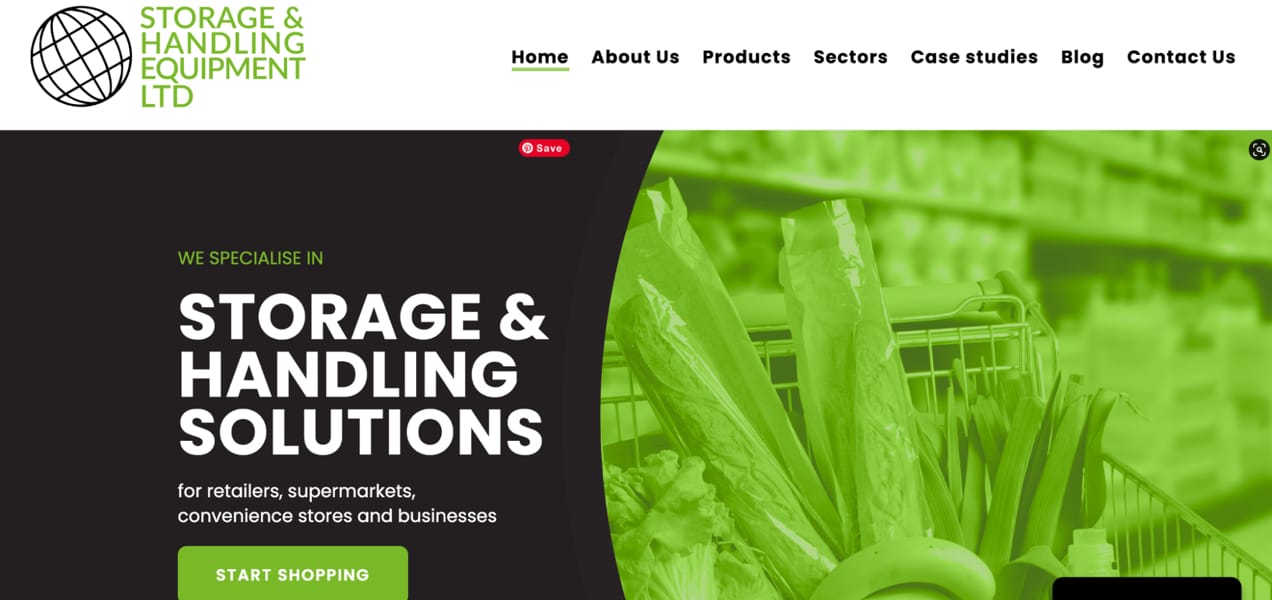
Physical products
Think equipment, printed training books, and cleaning supplies. Storage and Handling Equipment, for example, supplies eco-friendly shopping carts to retail and grocery stores.
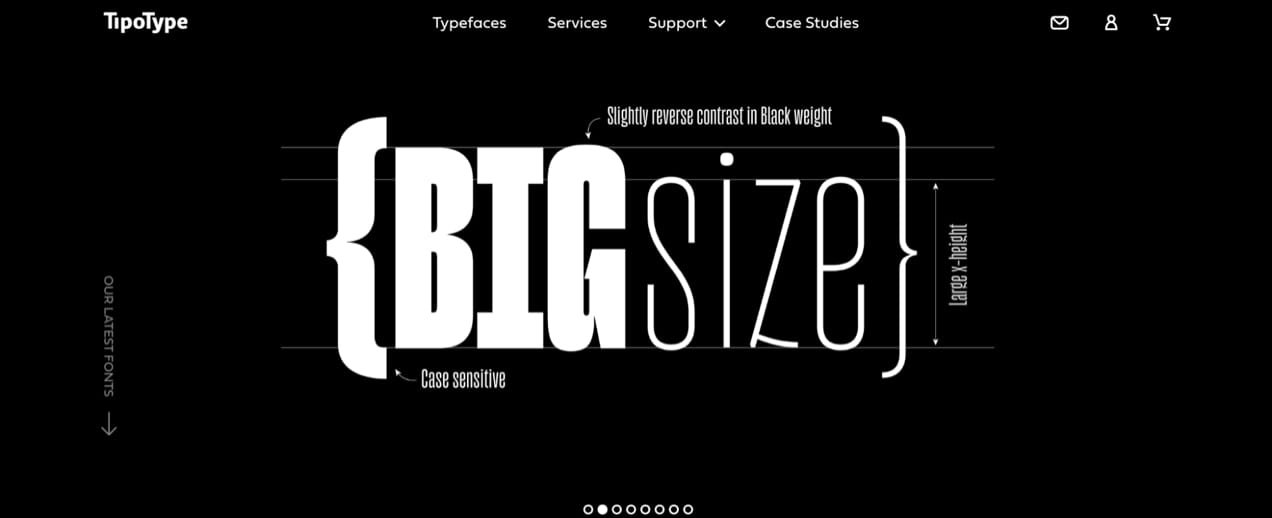
Digital products
Items like online courses, downloadable eBooks, and software licenses. TipoType, for instance, offers font licenses to businesses and freelancers.

Services
Offerings such as graphic design, accounting, and legal help. Your Benefit Store is a service provider, selling healthcare coverage that companies can include as part of their employees’ compensation packages.
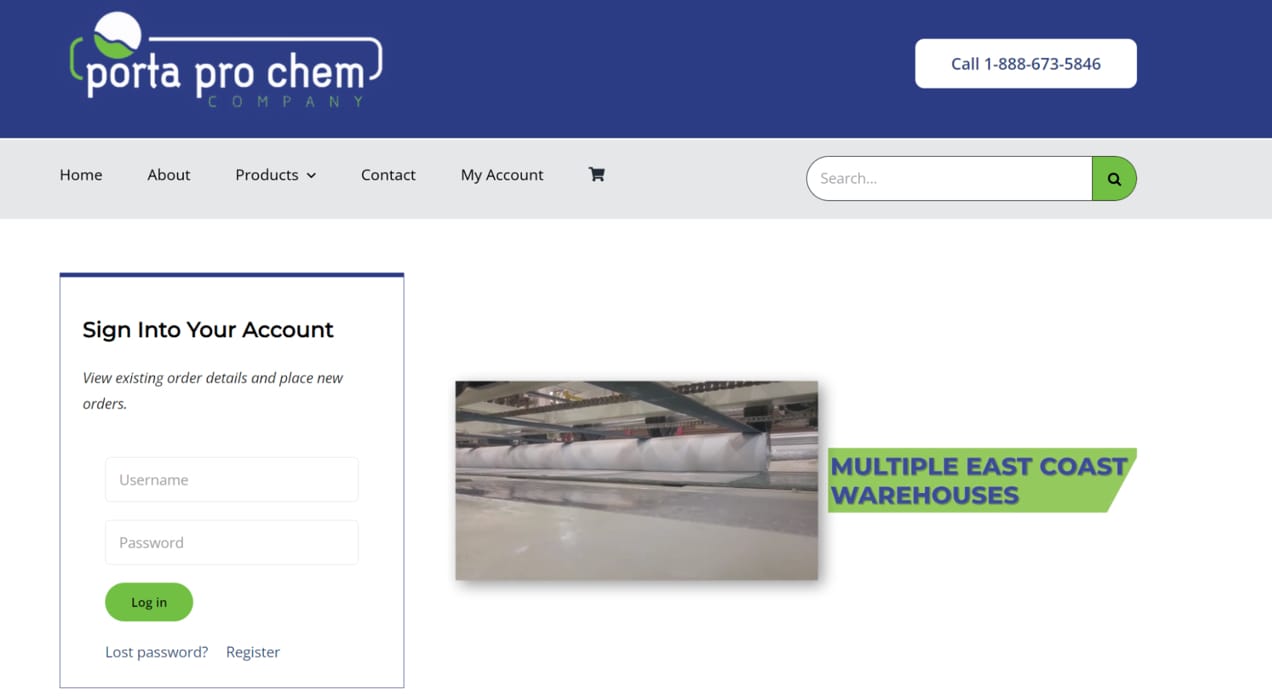
Wholesale items
Selling large volumes of products to retailers, essentially acting as their supplier. Porta Pro Chem, for example, sells portable restroom products to clients around the country.
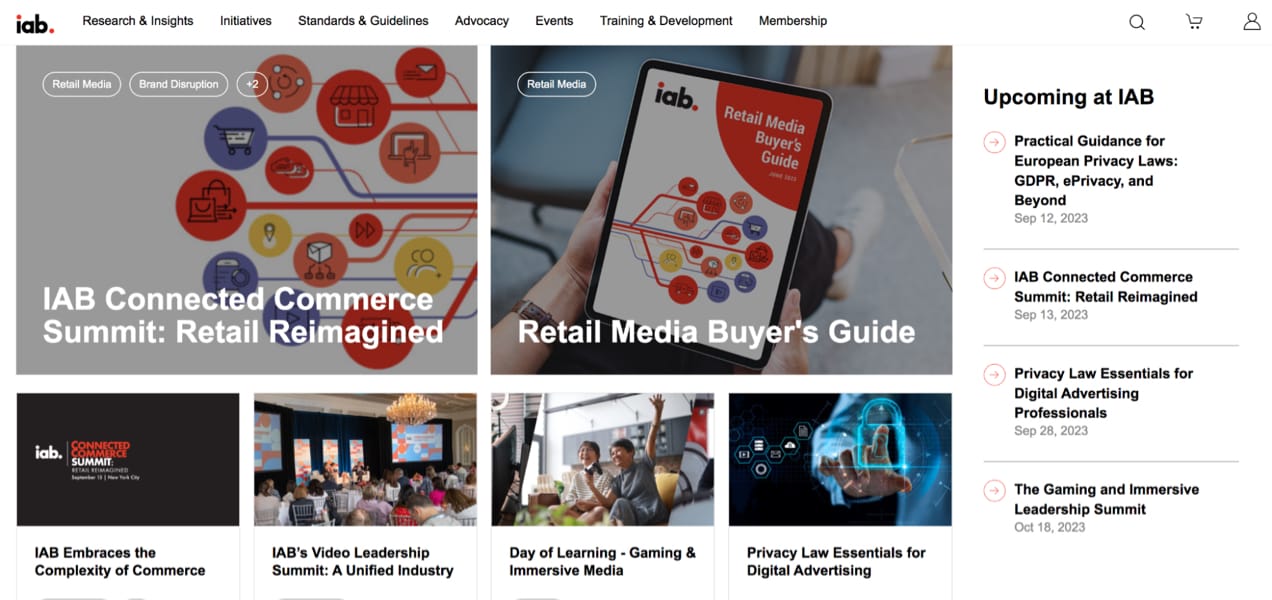
Memberships
Access to a collection of benefits and resources, such as a training video library or online forum. The Interactive Advertising Bureau, for instance, has a membership program with resources, courses, event invites and more, specifically for media and marketing companies.
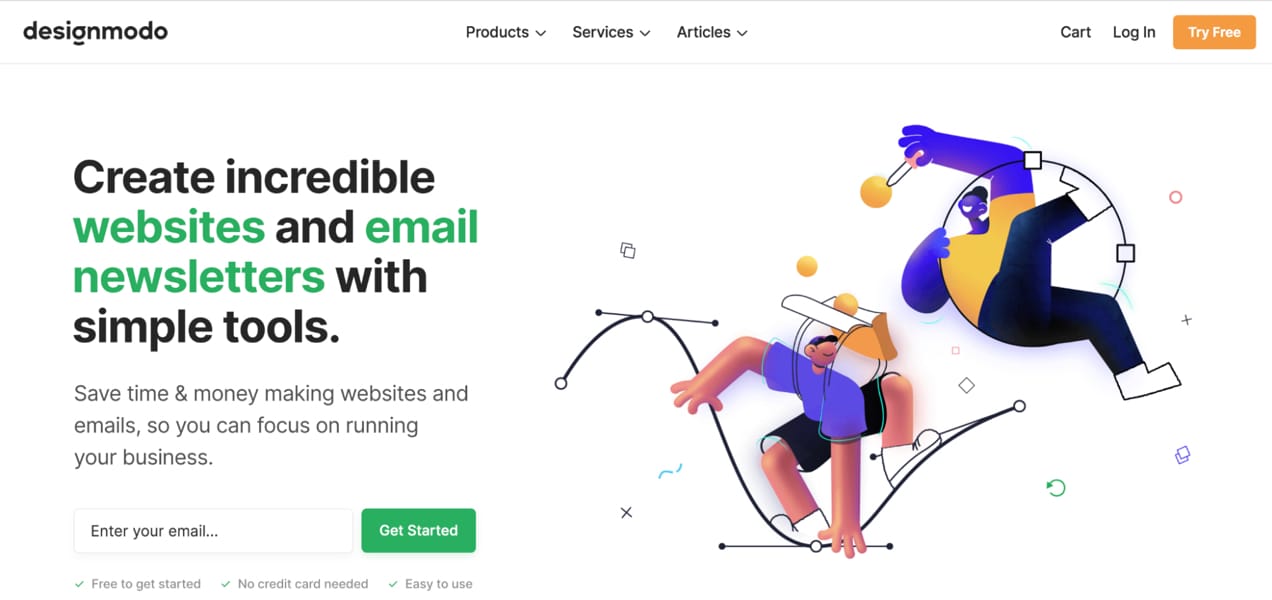
Subscriptions
Recurring products or services, like a yearly license, weekly cleaning service, or monthly box of coffee pods for the break room. Design Modo sells digital subscriptions to design tools, but subscriptions can also involve physical products or even newsletters.
As you can see, these all vary widely from one another, but there can also be overlap. You might be both a wholesale and a retail business. You could sell both physical and digital books side by side. Or you may have a subscription that includes a weekly office cleaning, and a box of supplies.
The point here is, you may want to do business in a variety of ways on the same platform — make sure the platform you choose supports all of them.
WooCommerce provides selling functionality for all of the products and services listed above, and more! In fact, all of the example sites mentioned are using WooCommerce. Sell one type of product or multiple side by side. Allow anyone to purchase, or restrict capabilities to specific clients or wholesale customers.
No matter what you want to sell or how you sell it, WooCommerce makes it possible.
Design flexibility
Just as your products and services are unique, your brand is, too. And, of course, you want your website to reflect the personality and characteristics of that brand.
Good B2B ecommerce platforms will allow you complete and total flexibility to design and build anything you can imagine — without having to edit code or hire a developer if you don’t want to.
Since WooCommerce is an extension of WordPress, you can harness the power of the Block Editor to build all of your pages and posts. The Block Editor enables you to drag and drop elements — like paragraphs, headings, images, videos, and columns — to create your own custom layout.
You can then toggle settings to customize colors, font styles, and other design characteristics to make the page your own.
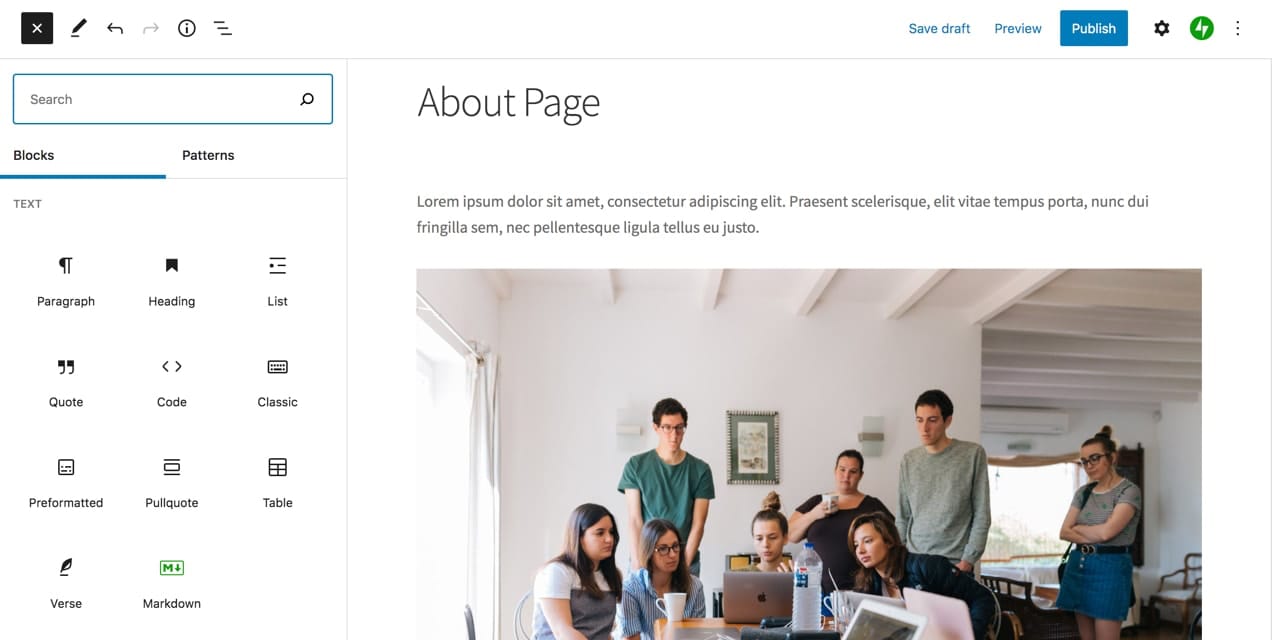
You can also use blocks to build and design global site elements, from headers and footers to product page templates. For example, you might add related products, videos, or specs to your product page design. Or perhaps you want to add filters to your category page sidebar. All of this is possible without working with code or hiring a developer.
There are also lots of free and premium themes you can choose from as starting points for your site design. Some are like blank slates, providing just the basics that you can truly customize to your heart’s content. Others offer ready-to-go designs and layouts. Just switch images, text, and colors and get selling!
Learn more about creating effective ecommerce website designs.
Content ownership
For B2B merchants, owning your content is absolutely critical. Your website is a source of revenue — you can’t risk the possibility of it disappearing.
You see, many proprietary B2B ecommerce platforms can take your site down with no warning if they decide that you’ve violated their terms and conditions. That means loss of revenue, time, and hard work!
But when you use WordPress and WooCommerce, you own and control what you create! Your website is hosted wherever you’d like it and you’ll never have to worry about WooCommerce taking down your site. Because it’s just that — yours.
Payment gateway integration
Payment gateways enable you to collect money from customers and clients securely, then transfer that money into your bank account. There are pros and cons of each tool, and certain functionality you’ll need for your specific business.
For example, you may need to collect recurring payments, accept multiple currencies, integrate with express pay tools like Apple Pay, or offer financing options.
You’ll want to make sure that the ecommerce platform you choose works with the one you want to use — especially if your business already uses something for payment collection and invoicing.
WooCommerce integrates with a wide array of payment solutions, including:
You can also use a fully-integrated payment gateway from WooCommerce, called WooPayments. It has a user friendly interface, allowing you to manage payments and refunds from the WordPress dashboard. Plus, it’s free to get started.But it still provides world-class functionality, like express pay options, recurring payment collection, and multi-currency support.
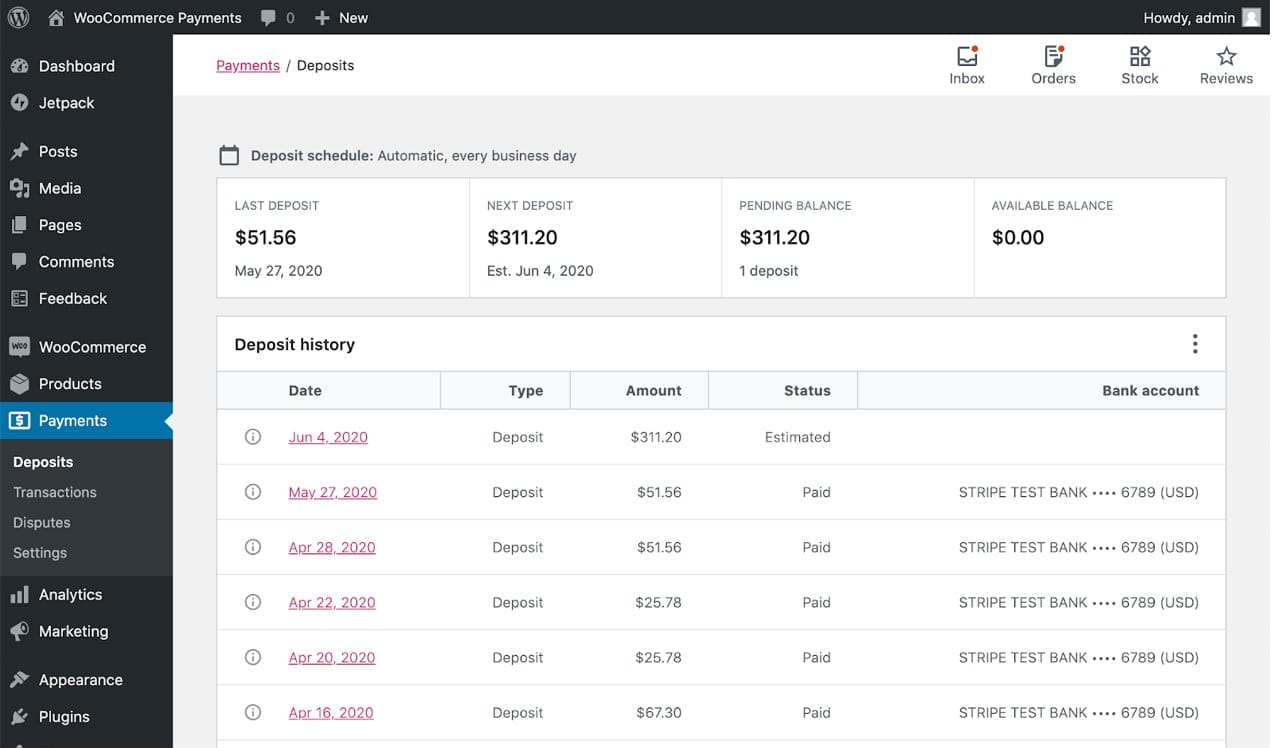
See a full list of gateways and learn more about choosing a payment gateway for your business.
Shipping
If you sell physical products, then shipping is going to be an important factor when it comes to choosing an ecommerce platform. Shipping can be complicated, so you need a tool that allows you to set up fees the way you want, and that integrates with any shipping carriers you work with.
This is especially true if you deliver large volumes of products at once, or have special requirements like refrigeration.
With WooCommerce, you have a lot of different options. Integrate with traditional carriers like USPS, FedEx, and UPS, or specialty providers like Purolator and Aramex. Charge flat rate shipping fees, offer free shipping, or charge based on a variety of factors like weight and cart total.
You can even set up complicated rules with the Table Rate Shipping extension. Manage everything from your WordPress dashboard with WooCommerce Shipping or connect to third-party tools like ShipStation.
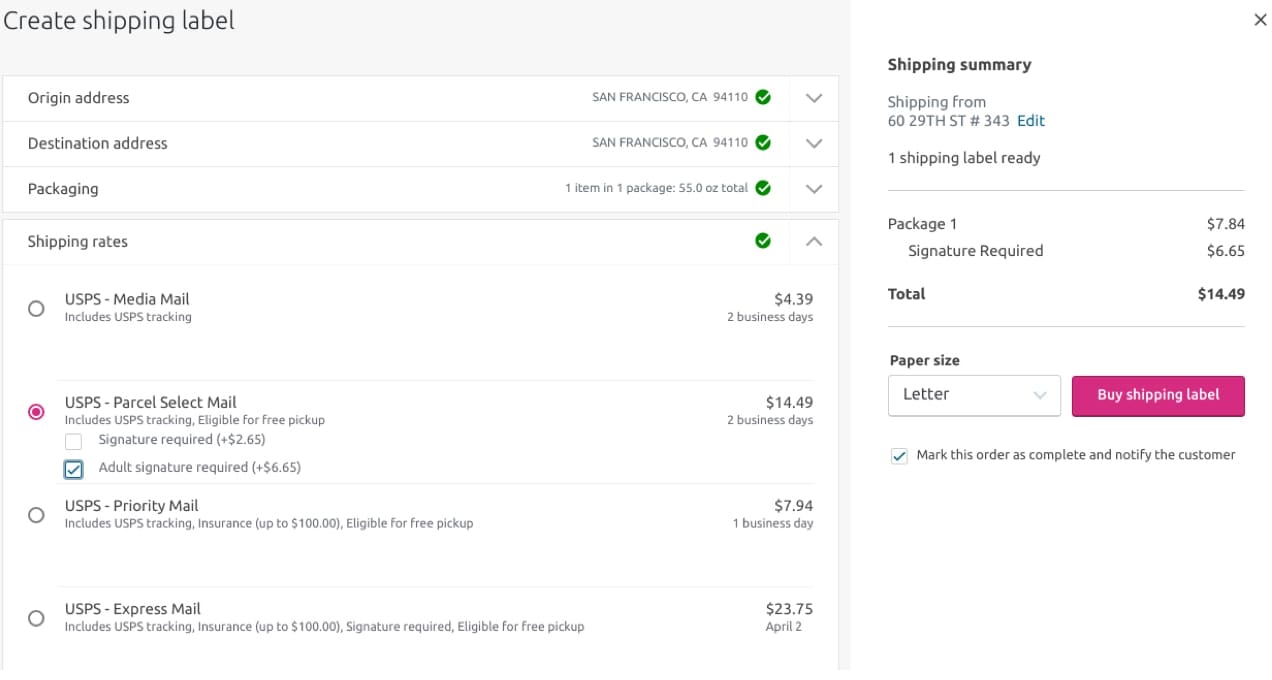
Read more in our ecommerce shipping guide.
Integration with other software
There are a wide array of tools that you may already use to run your business, or know that you want to implement in the future. Some of these may be marketing and customer service related — think email marketing platforms or CRM tools to organize customer data — but we’ll touch on these a bit later.
Others may include enterprise resource management software (ERPs), inventory management tools, accounting software, collaboration tools, etc. The point here is that you should take the time to verify that the platform you choose works seamlessly with all of the other types of software that are critical to your business.
WooCommerce, for example, offers high-quality extensions that make these types of integrations seamless and fast. And if, for some reason, one doesn’t already exist for the tool that you need, you can take advantage of the REST API and hire a developer to create one for you.
User experience
User experience is important for any business, for a variety of reasons. First, if a potential customer or client visits your site and it’s difficult to use, they’ll most likely give up and shop with a competitor instead. Second, search engines consider user experience when determining rankings. Your job, for now, is to find a platform that makes creating an excellent user experience possible. Here are some factors to think about:
Site speed
Avoid slow load times that will drive potential clients away! Your platform should be as lightweight as possible by default, and provide the ability for you to optimize for speed. Get top speed tips.
A streamlined checkout experience
The checkout process should be as easy-to-use and simple as possible to prevent abandoned carts. WooCommerce provides tools for one-page checkout, express payment options, on-site payments, and more to help with this.
Easy-to-use search tools
Help visitors find exactly what they’re looking for with an intuitive search bar. WordPress has great built-in search functionality, but you can also use tools like Jetpack Search, that offers a customer friendly interface with benefits that include instant filters and spelling correction.
Intuitive customer accounts or self-service portal
The businesses that you work with want to be able to update their accounts and orders without a huge hassle. Ideally, they should be able to make simple modifications without needing the help of your customer service team. Think changing subscription frequency, requesting a refund, updating payment information, and editing a password.
Content organization
Look for a B2B ecommerce platform that helps you structure your menus, categorize posts and products, and add features like breadcrumbs to help with navigation. Since WordPress was built as a blogging platform from the beginning, its content tools are unrivaled.
Mobile-friendly design
Your site should look great on devices of all sizes — desktops, tablets, and mobile phones. WordPress and WooCommerce are responsive by default, and there are lots of great mobile-friendly themes you can choose from.
Security
Security is important for any ecommerce website, but arguably even more so for those that conduct B2B commerce. Not only do you want to avoid putting your clients’ information at risk, you also want to protect your hard work and content. That’s why it’s so important to choose a secure platform with plenty of tools to keep your online business safe.
To begin, choose ecommerce software that’s built on a foundation of security. WordPress and WooCommerce, for example, prioritize security and, with a few simple steps on your end, your website and customer information will be locked down.
Also look for a platform that makes it simple to integrate solutions like real-time backups, automatic malware scans, activity logs, web application firewalls (WAFs), and other similar tools. These work together to provide a comprehensive security solution for your entire B2B ecommerce store.
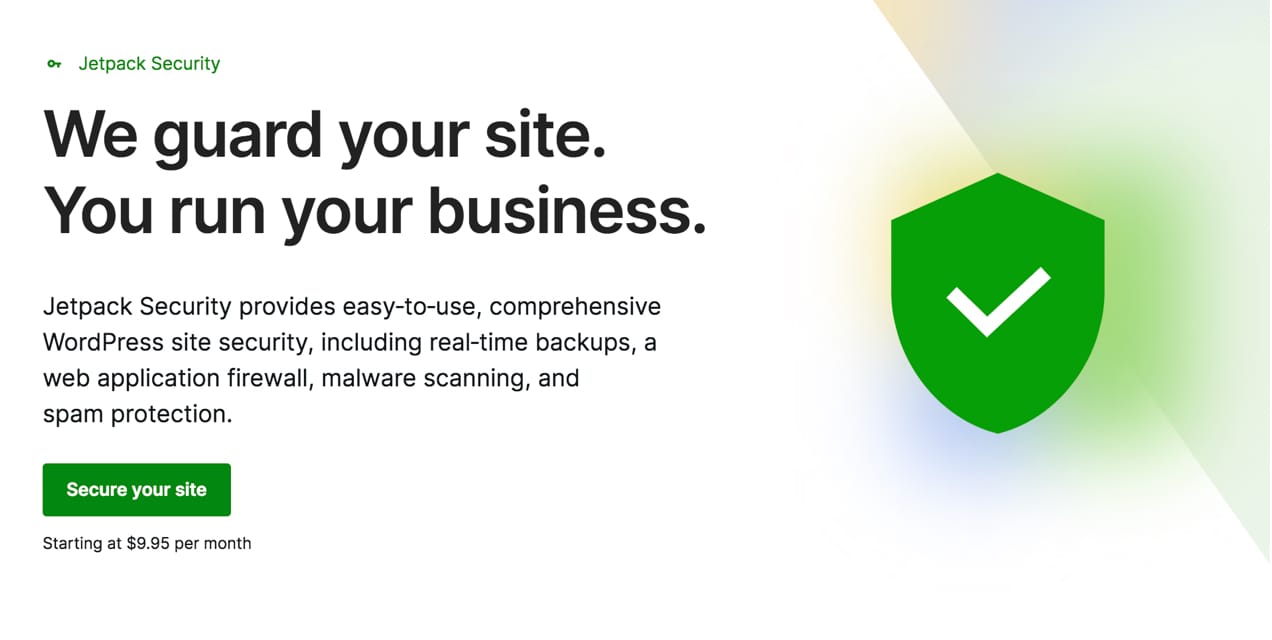
Jetpack Security is an excellent example of this. In one plan built specifically for WordPress sites, you can set up:
- Spam protection
- Real-time, off-site backups
- Automatic malware scanning and one-click fixes
- An activity log that shows all actions taken on your site
- Brute force attack protection
- A powerful website firewall
- Downtime monitoring
- Two-factor authentication
Beyond incorporating these types of tools, WooCommerce enables you to choose your own secure hosting provider, which should ideally offer essential features like SSL certificates, server-level backups, customer support, and more.
Customer service and marketing
Marketing tools, of course, help you reach new prospects and encourage more sales from existing ones. Good customer service helps you keep B2B buyers around and drive them to spread the word about your company. They’re both key to a successful B2B ecommerce store.
The B2B ecommerce platform that you work with should make all of your customer service and marketing strategies possible, whether that means integrating seamlessly with tools you already use or making it easy to add tracking codes.
Here are some marketing and customer service capabilities included with WooCommerce:
Integration with CRMs
Connect to the CRM of your choosing with extensions for Jetpack CRM, HubSpot, Salesforce, and more.
Integration with support forums and ticketing systems
Add live chat to your site, create a support forum, or integrate with tools like Freshdesk and HelpScout to make the lives of your customer service and sales reps easier.
Client portal possibilities
Build a client portal that enables customers to access resources and documentation, communicate with your service team, edit their purchases, and more.
Content creation capabilities
Regularly create beautiful, effective blog posts, landing pages, and more to support the rest of your marketing efforts and educate potential customers. The Block Editor allows you to do all of this without touching a line of code.
Integration with a wide array of marketing tools
Monitor traffic with Google Analytics, connect to social media platforms like Facebook and TikTok, publish Google ads right from your dashboard, send email messages, follow up on abandoned carts, and more.
Simplicity for team members
Give each member of your team their own account with permissions based on their role. Approved accounts can respond to support questions, view and process orders, administer refunds, publish blog posts, and more.
Email marketing
Email is one of the most powerful marketing methods at your disposal. Send abandoned cart emails. Stay top of mind with relevant content and updates. Welcome new clients to your business.
And, with WooCommerce, you can integrate a wide variety of tools that can help you accomplish this, such as MailPoet. You can even implement customer segmentation, to market to buyers based on previous behavior, likes and dislikes, and other characteristics.
Additional functionality
The functionality you need on your B2B eCommerce store is specific to your company. So think through any special requirements that you have. Here are some examples of essential ecommerce features that may apply to you:
- Customer specific pricing. You may want to offer special price lists for certain clients based on the agreement you have with their company. This may be based on user role (e.g. gold tier vs. silver tier) or each individual business you work with.
- Invoicing. Let customers place orders without payment, then send an invoice to their company at a later time.
- Quotes. You can hide prices and the “add to cart” button and require shoppers to request a quote instead. This is great for projects or orders with custom pricing.
- Deposits. Let customers place a deposit or start a payment plan.
- Products displayed based on user role. If you sell to different types of clients, you may want to hide certain products or categories based on their user role.
- Price calculation based on measurements. Add a price calculator based on factors like weight, area, length, and volume. This is perfect for equipment manufacturers or custom design projects.
- Wholesale capabilities. Set up a wholesale ecommerce store with custom user roles and pricing, registration forms, privatization, and rules for shipping, tax exemption, and more.
- Volume discounts. Offer bulk pricing and volume discounts to customers based on the number of products they purchase or the total in their cart.
Scalability
The B2B ecommerce platform that you choose should never hold you back. Watch out for ones that base fees off of sales, number of customers, or volume of site visits. Your platform should also load quickly, whether you have 100 visitors or 100,000.
WooCommerce can scale with you to any size. There’s no limit to the number of products or variations you can have (in fact, this test site had one million!).
It’s built to handle large volumes of orders and traffic spikes. It’s a completely free B2B ecommerce platform, though you may want to use paid extensions, and the pricing is never based on factors like sales or customers.
The best part? You can choose any hosting provider that you’d like. That means that, while you may have a shared hosting plan right now, you can always upgrade to a VPS or dedicated server as your traffic increases without impacting your online store.
With Woo, high-volume stores qualify for unique benefits like dedicated support and discounted extensions. Learn more about how our team can help your business grow.
Ease of use and management
In the business world, time is money. And you can’t afford to waste time on a platform that’s hard to use, difficult for new employees to learn, and that requires a developer to make even the smallest of modifications.
While you can hire a developer to manage your site if you’d like, you certainly don’t have to in order to make the most of your WooCommerce store. As we mentioned earlier, the Block Editor enables you to rearrange, add, and delete elements by simply dragging and dropping.
Want to revise your products? You can do so by clicking buttons and editing fields — no code necessary!
Store managers can access everything from inventory management and ecommerce analytics tools to order information all in a single platform. And if you use tools like Jetpack CRM, WooCommerce Shipping, and WooPayments, you can handle label printing, payments, refunds, quotes, and more directly from your dashboard as well.
Plus, WooCommerce offers unrivaled customer support and thorough documentation to help you every step of the way.
And if you do want to hire a professional to develop, maintain, or customize your store, check out our list of WooExperts. They’re vetted, high-quality agencies ready to help!
Examples of B2B ecommerce businesses
↑ Back to topDo you have a wholesale store or other B2B operation and want a little bit of inspiration? Let’s look at a few examples of stores using WooCommerce to run a B2B operation.
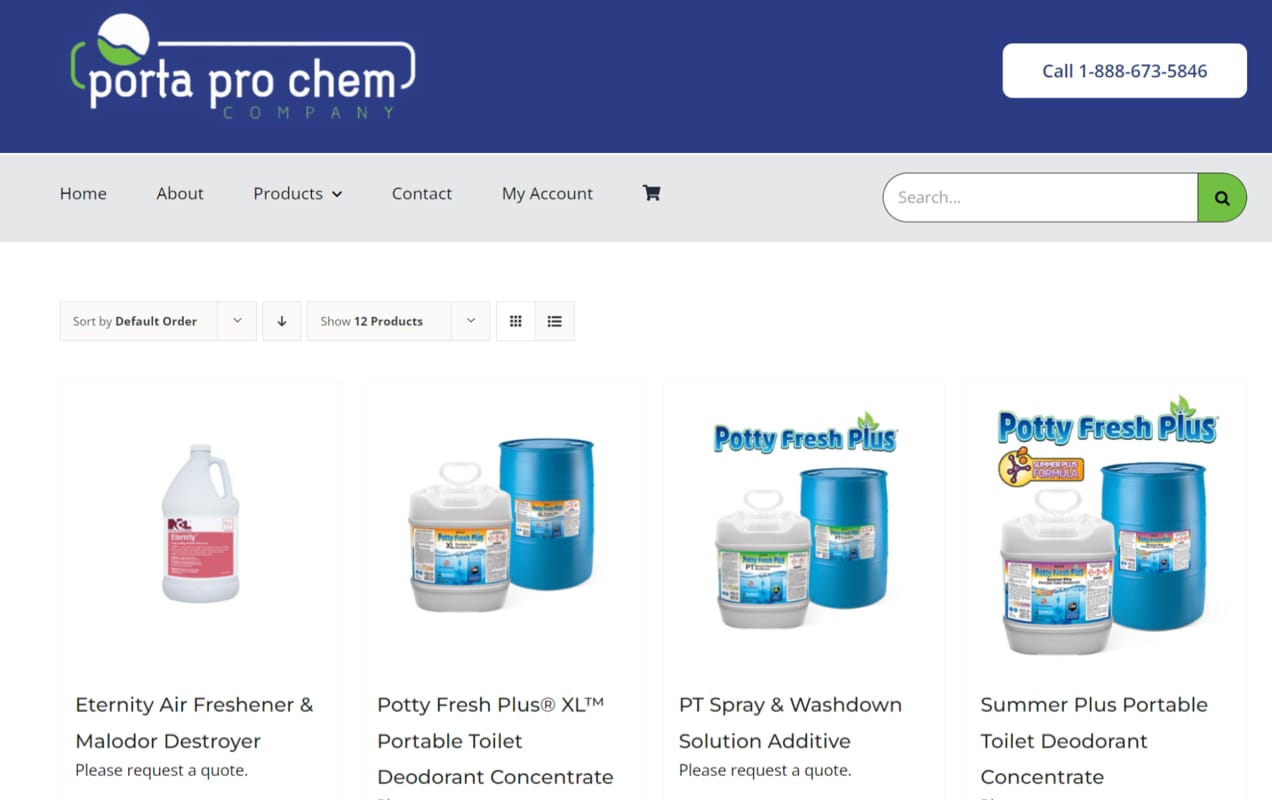
1. Porta Pro Chem
Porta Pro Chem is a supplier for the portable restroom industry, selling items like toilet paper, sanitizer, and cleaners to businesses around the country. Their shop was built entirely with their B2B clients in mind.
Using tools like the B2B for WooCommerce extension, they hid pricing for the majority of their products, making those just visible to logged-in customers. New visitors can easily request a quote for an item if they’d like, or purchase a few select products without creating an account.
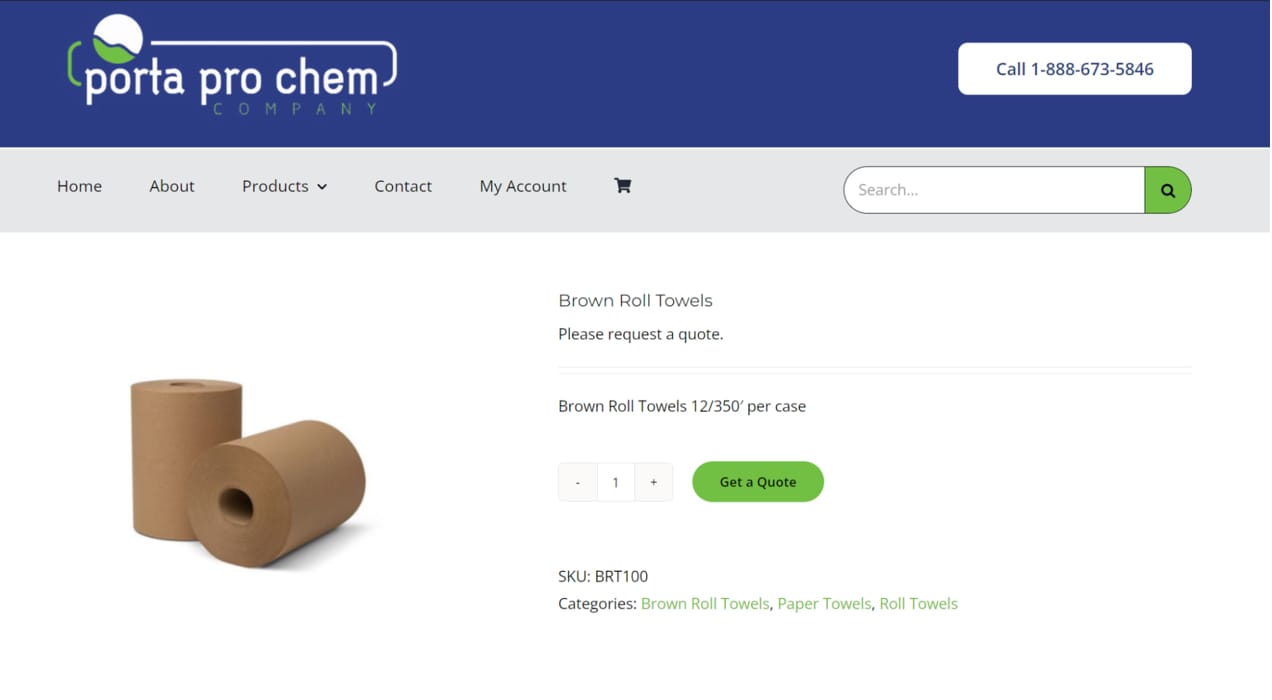
Shipping rates and pricing for existing customers is based on specific user roles assigned to each one. The website also has powerful features like a mega menu to make finding items easier, accounts that customers can manage on the backend, and invoicing capabilities.
2. Fuji Electric
Fuji Electric has been an innovator in industrial power electronics equipment for a century! They serve industries such as power generation, automotive, manufacturing, and medical with items from blowers and pumps to semiconductors and turbines.
Considering their wide scope, their website needed to appeal to a variety of audiences. They have an easy-to-use product finder tool that allows shoppers to select their industry and location to determine how to access specific items. They also incorporate features like breadcrumbs, search tools, and nested menus to guide shoppers to the right products.
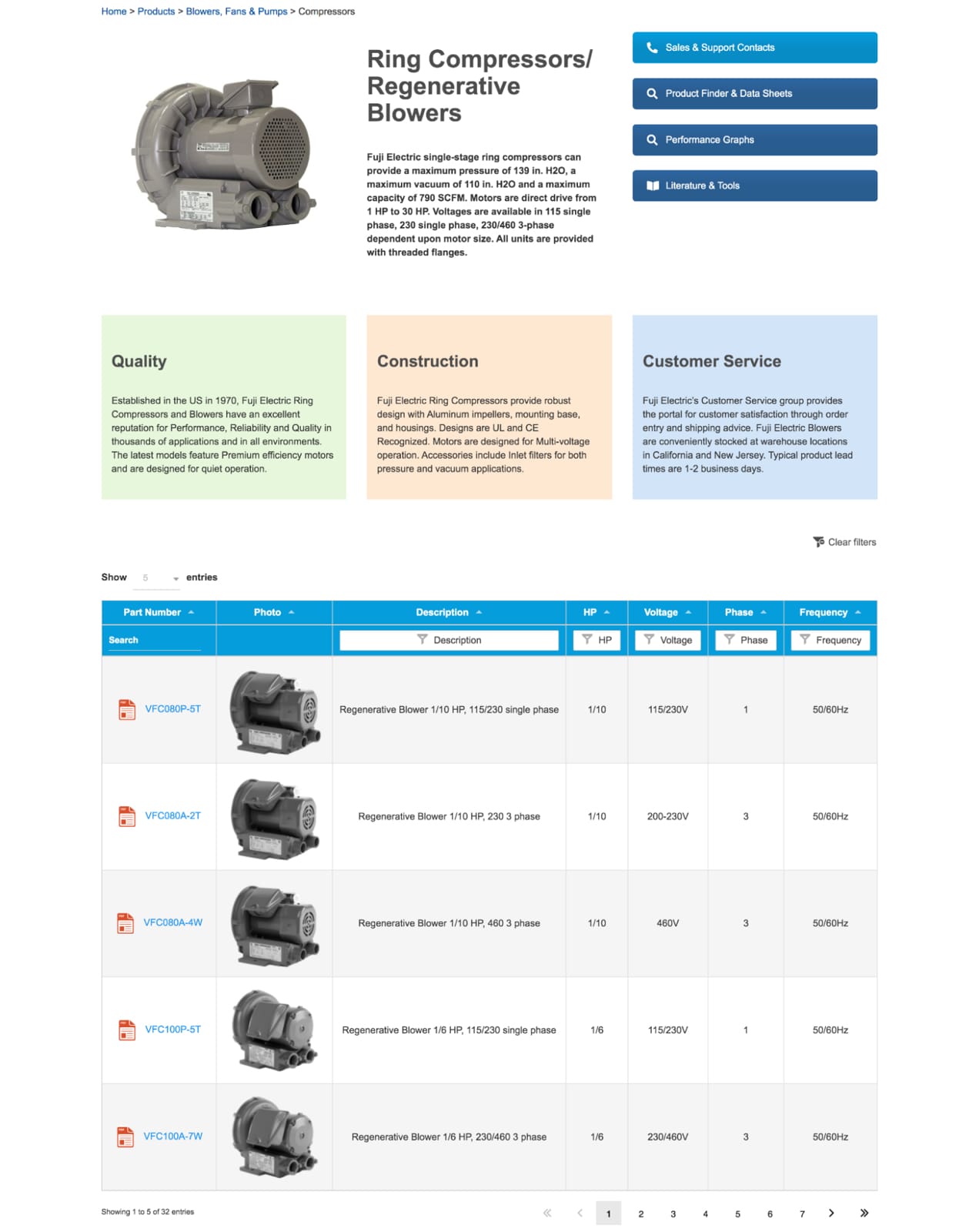
Finally, they created detailed product pages that include all the information their corporate clients might need. They include photos, detailed descriptions, specs, manuals, performance graphs, and links to their customer service team.
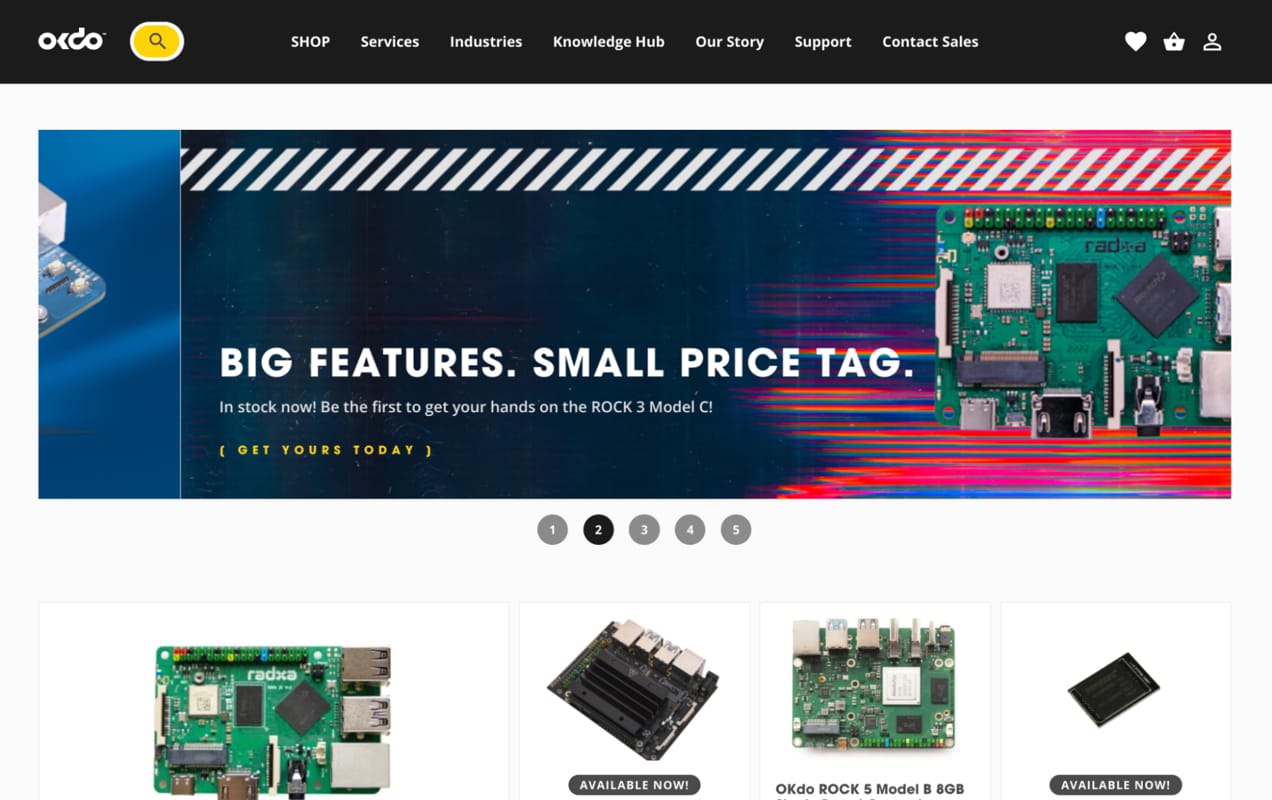
3. OKdo
OKdo is a technology company that sells products focused on single-board computing and the Internet of Things. They offer hardware, software, development support, and manufacturing to hobbyists, business owners, industrial designers, and resellers.
They used APIs and custom integrations to connect to all the tools that they need, including payment mechanisms, email service providers (ESPs), third-party logistics (3PL) services, and ERP integration solutions. OKdo also has different versions of their site available to international users based on their location.

Their product pages are chock full of information like photos, videos, wishlist tools, specifications, reviews, reference docs, and more. Plus, they have a knowledge hub with tons of helpful information for each type of customer.
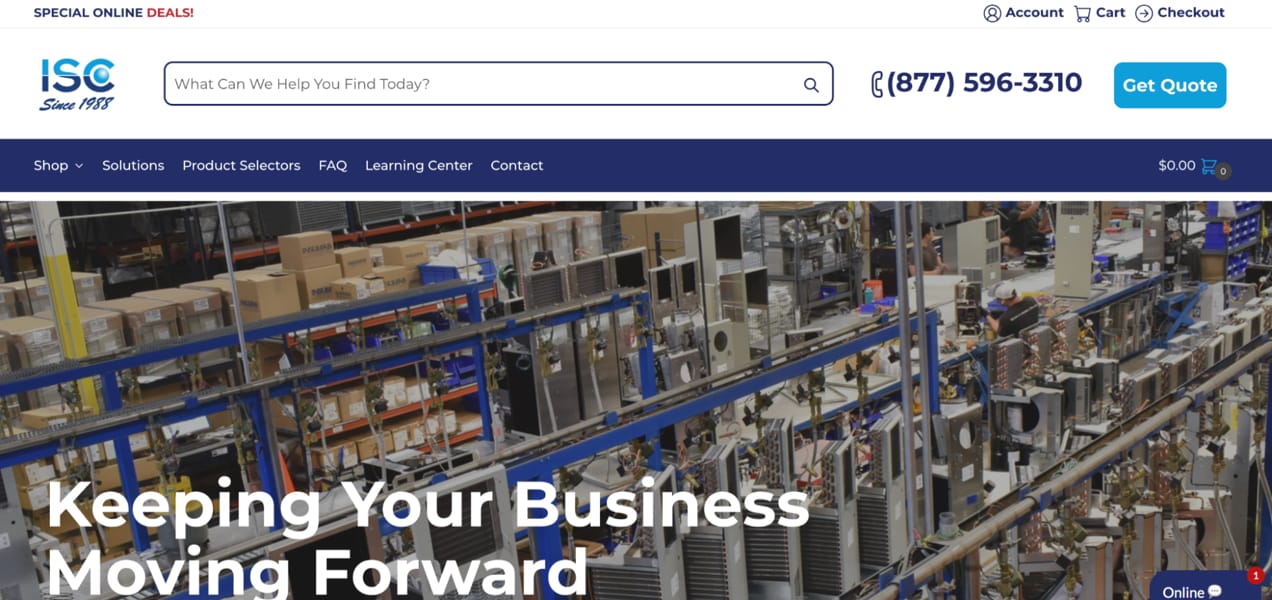
4. ISC Sales
ISC Sales is an industrial equipment supply company with more than 17,000 products listed on their B2B ecommerce store. To make sorting through all of those items easier, they have a variety of product selectors that narrow down the product category based on customers’ needs.

They also employ filters, categories and sub-categories, search tools, and detailed product listings to help shoppers find the right fit for them. For some products, they have buttons to request a quote rather than pricing.
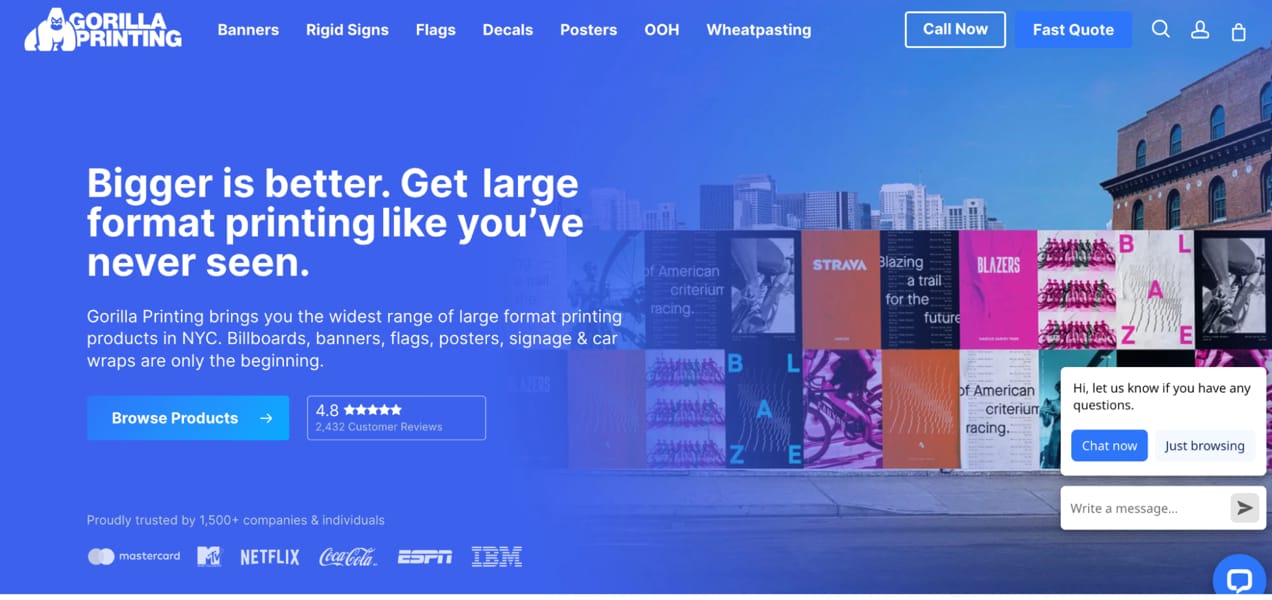
5. Gorilla Printing
Gorilla Printing is a large-format printing company based out of New York. They ship nationwide, and sell everything from banners and signage to flags and vehicle wraps.
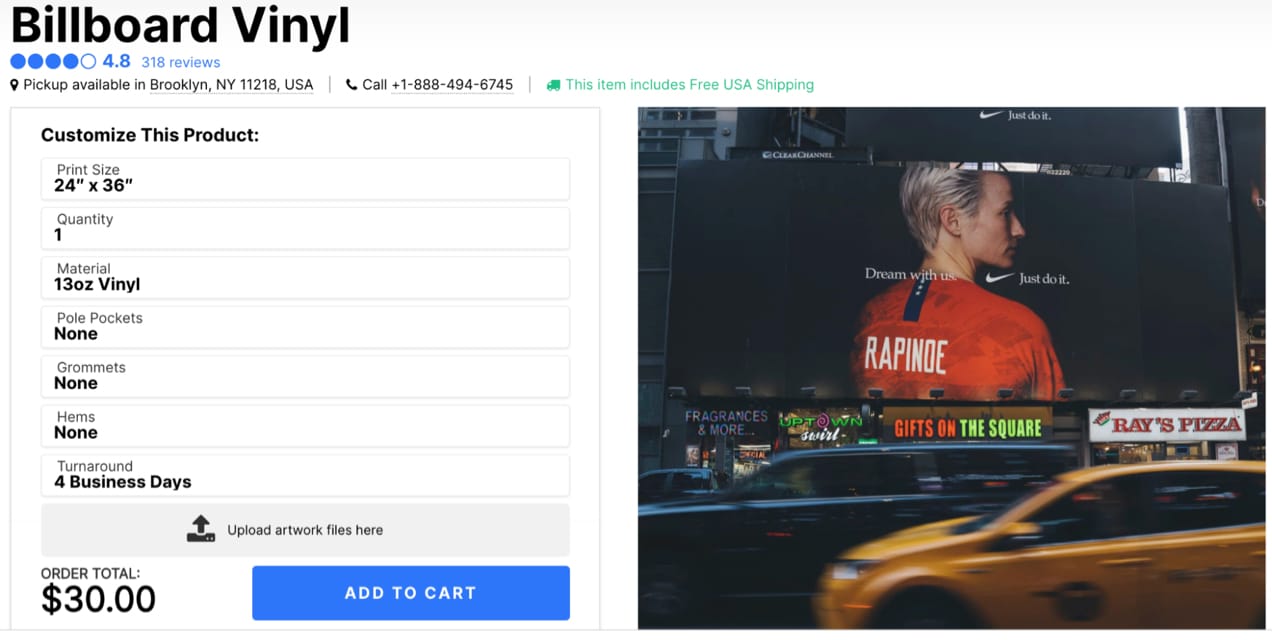
Their customization process enables businesses to select details like size and material, and even upload their files directly on the website. If a company isn’t quite sure what they’re looking for, they can fill out a fast quote form to get some help.
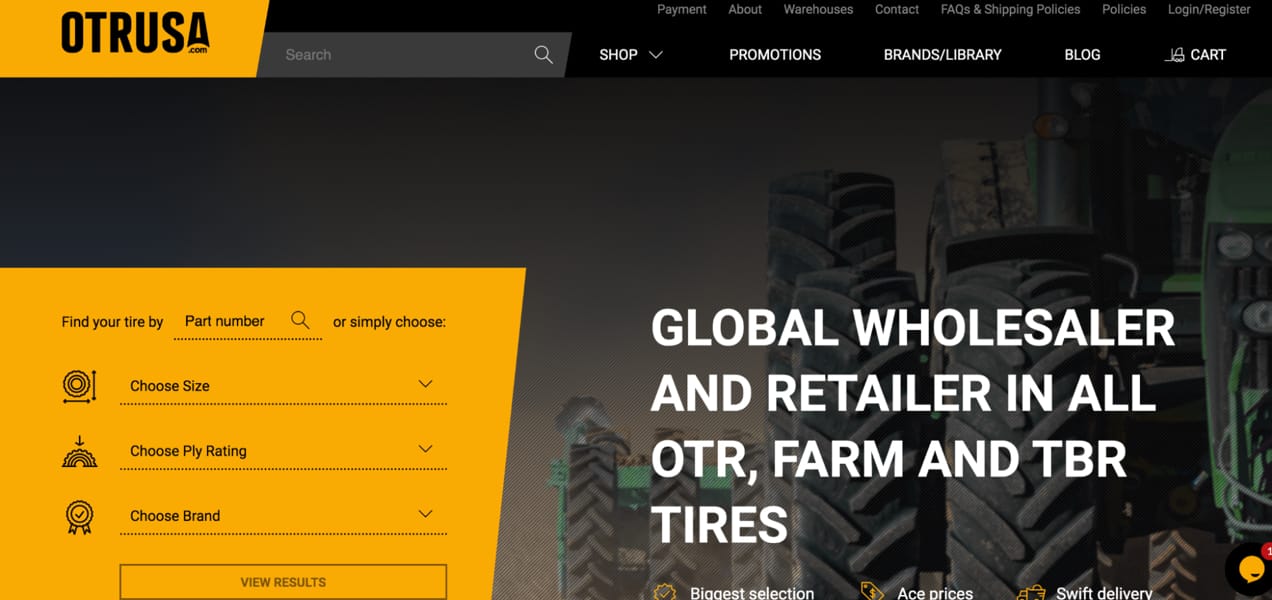
6. OTRUSA
OTRUSA is a global wholesaler and retailer of tires for industrial equipment. They feature an easy-to-use filtering tool that lets shoppers narrow down their search by size, ply rating, and brand — or they can simply type in what they’re looking for.
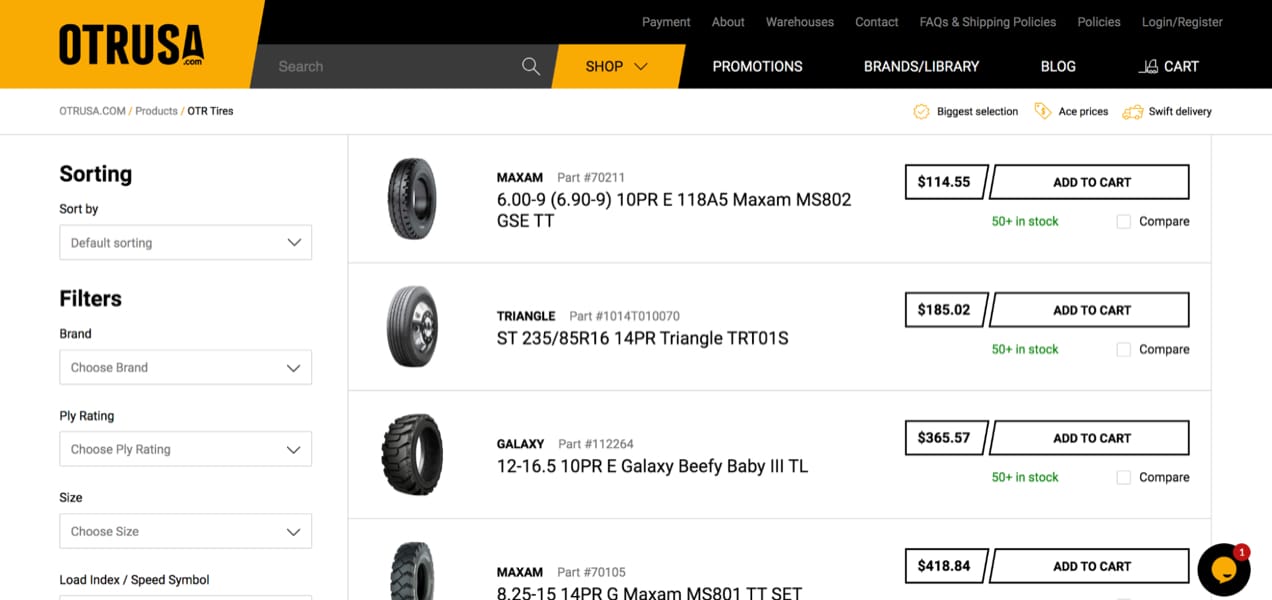
Other features include an intricate filtering sidebar on product category pages, commercial credit financing, live chat capabilities, and even a membership program that includes discounts.
FAQs about B2B ecommerce platforms
↑ Back to topStill have questions? Let’s address some of the most common ones.
What is a B2B ecommerce platform?
A business to business (B2B) ecommerce platform is software that provides all the tools you need to sell online. It goes beyond your basic online store, allowing access to specialized functionality like wholesale pricing, invoicing, quotes, bulk discounts, and more.
Ultimately, high-quality software will support the B2B business model, making things as easy as possible for the company using it, along with their clients.
What is WooCommerce?
WooCommerce is a free WordPress plugin that includes all the B2B ecommerce features you need to sell online
WooCommerce is run by Automattic, the company behind WordPress.com, and is used by a huge variety of stores. Ecommerce shops from small handmade artisans to large enterprise businesses take advantage of its powerful tools to find success.
Is it possible to run a B2B/B2C hybrid ecommerce store?
Yes, absolutely. This is a business model that’s quite common, in fact. With a tool like WooCommerce, you can sell the same products to both B2B and B2C customers on the same storefront.
For example, the B2B for WooCommerce extension enables you to:
- Hide products and items based on user role. For example, you could have some items available for B2C customers, with others visible just to the businesses you work with.
- Configure customer specific pricing for different user roles. So you might have one set of prices for standard shoppers and another, with discounts, for wholesale buyers.
- Allow B2B customers to request a quote. You can even customize the quote form fields just for your business needs.
These are just a few examples. You can customize your WooCommerce store to fit whatever your needs are. The key here, though, is to personalize the experience (and your marketing strategies!) for both B2C and B2B customers, so both feel like their needs are being met.
How do I choose between B2B ecommerce platforms for my business?
The right ecommerce software for your business to business company will depend on the specific needs you have. We’ve provided a pretty comprehensive list of considerations, from pricing and functionality to security and marketing capabilities. Sit down with your team, make a list of what you want to accomplish with your store, and make sure that the platform you choose checks all the boxes.
WooCommerce and WordPress are flexible and powerful enough to meet the needs of nearly any business to business operation. Not only does it offer extensions to meet the needs of B2B organizations, it also offers excellent support, security solutions, content creation tools, and more.
Is WooCommerce an enterprise-grade ecommerce platform?
WooCommerce is an excellent choice for enterprise businesses. It provides all the functionality needed to scale and is built for a large volume of orders. Enterprise stores will benefit from limitless flexibility, full content ownership, and free core software regardless of your sales volume. Learn more about how WooCommerce scales.
You may also want to consider WordPress VIP, an advanced solution built specifically for enterprise organizations. In addition to the excellent features that are already included with WordPress and WooCommerce, you benefit from comprehensive security, top-level hosting, data analytics, and content tools designed around the needs of enterprises.
What are the different types of B2B businesses?
Since B2B simply stands for “business to business”, this can cover a wide array of organizations. Here are a few of the most common types:
- Product-based: Sell physical items to other companies. They might be wholesalers, distributors, or manufacturers.
- Service-based: Sell services to other companies. Think accounting, consultation, or insurance providers.
- Software-based: Sell software that helps businesses in some capacity. This includes invoicing tools, security services, and more.
A store on a B2B ecommerce platform might provide any or all of these offerings to their customers, and the structure of their operation may look different. The important factor is that they’re selling to businesses, though they may also sell to consumers.
Build and grow your B2B ecommerce store with WooCommerce
↑ Back to topWhether you’re an established B2B company or just starting out, WooCommerce is an open source ecommerce solution that offers all the tools and flexibility you need to grow. You can create and customize without writing or editing any code at all, or work with a developer to design an intricate selling platform.
It harnesses the power of WordPress to provide unrivaled content capabilities, and includes lots of extensions that help you customize the online experience for your customers. Plus, it can help improve your marketing strategies and even make your team more efficient.
Looking for more information? These guides can help:
- How to Start an Online Business
- Tips for Choosing a Wholesale Provider
- A Guide to Selling Wholesale with WooCommerce
- Designing a Successful Client Onboarding Process
About






Thanks so much for putting up that blog. It has a lot of information that will help me open my own store. I really appreciate your efforts. May God bless you.
Thanks so much, Emma! Glad you found it helpful!